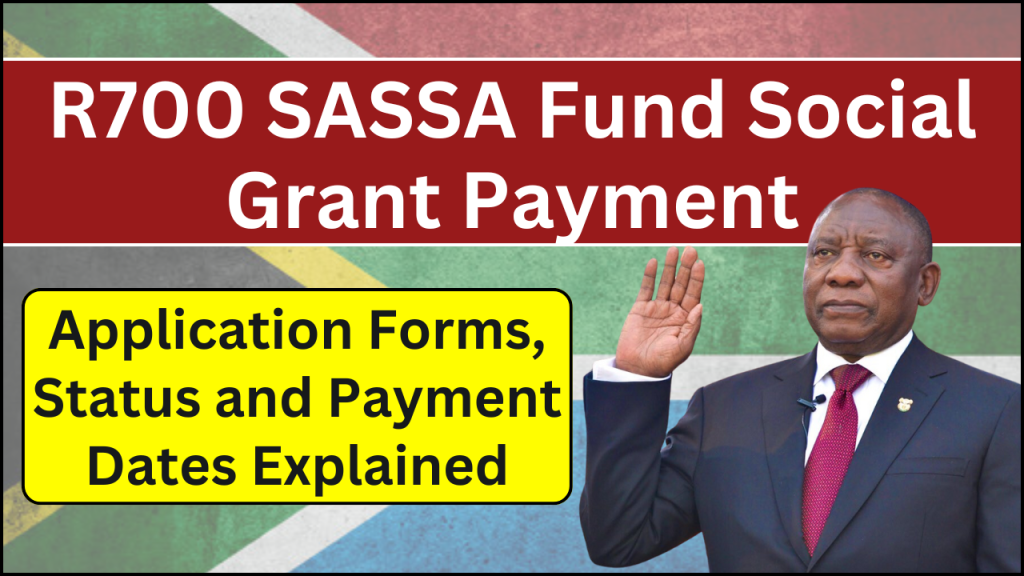
The South African Social Security Agency (SASSA) helps many individuals in South Africa by providing financial support, especially for vulnerable citizens. Recently, some misleading information regarding an R700 Social Grant for 2025 has been circulating online, catching the attention of people looking for financial aid. If you have seen messages or posts about this grant on social media or WhatsApp, you should be cautious as it may be part of a scam.
Let’s explore the truth behind these claims, give a clear breakdown of what to look out for, and provide practical advice on how to protect yourself from scams.
What Is the SASSA R700 Grant Claim About?
The message that is being widely circulated online claims that SASSA is offering a “R700 Grant” to South African citizens between the ages of 18 and 65. According to this message, the grant is open for applications, and successful applicants will begin to receive payments soon.
Here is an example of a message going around:
“Apply now for the R700 Grant 2025 through the official SASSA portal. Successful applications will receive payments shortly. 675,000 people will benefit. Apply here: [fake link provided].”
At first glance, the offer might seem appealing, especially for those struggling with financial issues, but upon deeper inspection, it is clear that this is a scam. Let’s look closely at how to spot the warning signs of fraudulent claims.
Spotting the Red Flags in the R700 Grant Offer
There are a number of clues that indicate that the offer of the R700 Grant is not legitimate. These include suspicious links, misleading messages, and other signs that may cause harm.
Here’s how you can spot a scam:
1. Suspicious Links or URLs
- The URL provided in these messages doesn’t belong to an official SASSA website. Official SASSA sites use the domain “sassa.gov.za” and not strange or unverified links.
2. Warnings from Antivirus Software
- Clicking the link might trigger warnings from your antivirus software, indicating that the website could be dangerous. This is a clear red flag.
3. Poor Website Quality
- Fraudulent sites often feature low-quality design, including unclear logos, poor formatting, and confusing navigation. Genuine websites, like SASSA’s, are always well-designed and professional.
4. Fake Testimonials
- These scam pages may include made-up testimonials or fake comments that claim the grant has already been given to others. Official government websites do not use this tactic to advertise social grants.
5. Spelling and Grammar Errors
- A common trait of scam communications is the use of incorrect grammar or spelling mistakes. SASSA and other official government institutions use professional, error-free language in their messages.
What to Do if You Encounter a Scam
If you think you have encountered a scam or mistakenly provided your personal details, it is important to act quickly. Here are the steps to take immediately:
1. Stop Engaging
- Don’t reply to suspicious messages or continue engaging with scammers. Ignore the links or attachments they provide.
2. Change Your Passwords
- If you entered any personal information or account details on the fake website, immediately change your passwords for all your online accounts.
3. Contact SASSA Directly
- It is crucial to contact SASSA through the official channels. If you’ve shared personal details with a scam site, report it directly to SASSA’s fraud department for guidance.
4. Report the Scam
- Report the scam to the South African Police Service or your local authorities. This helps prevent others from falling victim to the same scheme.
How to Stay Safe and Avoid Scams?
To avoid falling for scams like the R700 Grant trick, you must take certain precautions. Here are some easy steps to stay protected:
1. Verify Information on Official Platforms
- Always rely on trusted sources. Visit SASSA’s official website (www.sassa.gov.za) and check for announcements about grants and other financial assistance. Also, use the SASSA helpline for inquiries.
2. Avoid Unofficial Channels
- Avoid using links from social media, WhatsApp groups, or any unofficial sources. Scammers will often share fake links to collect your personal data.
3. Do Not Share Personal Details
- Never provide sensitive personal details like your ID number, bank details, or passwords through text messages, unverified emails, or websites. SASSA will never ask for this information through unofficial channels.
4. Consult Local Offices
- If you are unsure, you can visit your nearest SASSA office for assistance. They provide help with applications and can answer any questions you have.
How to Identify and Avoid the R700 Grant Scam?
| Red Flag | What to Look For | How to Respond |
|---|---|---|
| Suspicious URL | Website link is not official (doesn’t end with sassa.gov.za) | Do not click. Report as a scam. |
| Poor Website Quality | Low-quality website design with errors and blurry logos | Avoid entering any details. |
| Fake Testimonials | Testimonials about the grant from supposed recipients | Ignore fake reviews; check SASSA website for info. |
| Grammar Errors | Multiple spelling or grammar mistakes | Ignore messages, as they likely aren’t legitimate. |
| Contact Information | Request for personal info (ID number, phone, etc.) | Don’t share sensitive information. |
Important Information About SASSA Payments
It’s always best to know about upcoming payments for those receiving legitimate social grants through SASSA. The following details might be useful for those expecting their grant payments in 2025:
- January 2025 Payments: The first payments will begin in mid-January. Dates may vary depending on the grant type.
- February 2025 Payments: SASSA payments for February are set to roll out starting early in the month.
Payment dates and times are typically fixed, and recipients will be notified through official channels. Always check for updates on SASSA’s website.
FAQs
Q1: Is there really an R700 Grant being offered?
Ans: No. There is no R700 grant offered by SASSA for 2025. All online applications claiming so are part of a scam.
Q2: How can I be sure a message about SASSA payments is legitimate?
Ans: Always confirm through official SASSA contact points, such as their website and verified phone numbers. Do not trust random links sent to you via WhatsApp or social media.
Q3: I’ve shared my personal details with a suspicious website. What should I do?
Ans: Immediately stop engaging with the website and contact SASSA for guidance. Change your passwords and alert your bank if necessary.
Conclusion
The rise of online scams targeting those in need is concerning, but you can protect yourself. Remember that no new R700 social grant has been announced by SASSA for 2025, and any application for this is fraudulent. Always verify information through SASSA’s official platforms and be cautious about giving away personal details.
Share this information with friends and family to ensure that they, too, do not fall victim to such scams. Keeping yourself and your community informed is the best defense against fraud.


